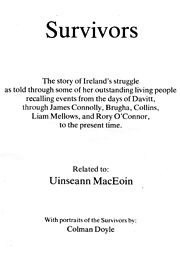
Twenty five years after '98 Dr. Richard R. Madden
commenced to
collect from the
living sources for his Lives of the United Irishmen.
It is
for that reason that the story of Anne Devlin.
Henry Joy McCracken.
Henry
Munroe, James Hope, and the others still survive.
Four years ago it occurred to me to collect the story
of some of the
Survivors of
our own day. but it was only in the late autumn of 1978
that I really got down to the task. I found
that out of my original list of around two dozen people all of them still
survived. Most of them were
known
to me personally which made it infinitely easier.
Why bother to record them?
Because it had not been done before, at least not
quite the same
way. and in
their own words, although two or three of them are
internationally known and have written much. The book
histories of
the period record a
part of the story while the official military accounts - apart from not being available to all
- are blighted
by their cold
impartiality. I
believe that there are many stories, some small and unimportant, recorded here
for the first time. There is much that is already known, but there is a great
deal that has never been known
before.
They are all from "one side of the
house", except for one pacifist who
took no side in the post 1922 conflict. I chose them
deliberately
for the reason that if I had chosen people who, at the great parting, had gone
All of my Survivors (and there are a few. alas,
who are now gone
from us) have
long come to terms with the sort of Ireland and the sort of system, that
emerged in Ireland after 1922. I shall not put words in
their mouths, or say things that they did not
say. I shall conclude simply
by
quoting from Sean O Faolain, another great Survivor, writing in
1966:
"We Republicans are not interested
primarily in the modes and
forms
of government. We are interested sensibly, in the form of life,
the kind of society that we have always, without
ever closely defining it. associated with the ideas and personalities of Tone.
Lalor. Mitchel,
Davis,
Connolly, and Pearse, centred about such fairly clear principles
as the rights of man, personal freedom, equal
rights and equal
opportunities
for all citizens, and a government representative of
every section of the community including especially
Tone's best
friends, that large
and respectable class the men of no property.
"We were right not to believe that
constitutional formalities could,
of their own verbal force, achieve Tone's and Pearse's social
aspirations. We had only to look about us at the
society that was
spawned both by
1922 and 1932 to see on all sides the most blatant
inequalities, the clear absence of equal
opportunities, and a large
and
privileged minority, a bourgeois class utterly devoid of moral
courage
"What we have is a modern version of the kind of
society that James
Joyce described
so contemptuously in the Dublin of 1902, a society
that differs only in that Irish names have been
plastered over English
names,
and that there were then some few men who had hopes that the
Sovereign People would one day rise up against it
and transform it
utterly. Alas,
all that has happened is that the Sovereign People live now in a state of total
admiration of their own handiwork".
Was he speaking for all our Survivors when he wrote
that?
Uinseoin MacEoin